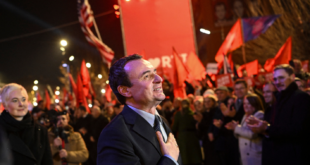MITROVICA – An Albanian group has filed a lawsuit against parallel structures set up to administer ethnic Serbs within Kosovo.
Serbia had lost control over Kosovo, which it still claims as its southern district, after the North Atlantic Treaty Organisation (NATO) bombing in 1999. That followed a period of repression of ethnic Albanians within Kosovo.
Kosovo declared independence in February last year, though not many countries have recognised it. The area has a population of about two million Albanians, but also tens of thousands of Serbs, who have maintained parallel structures with support from Serbia.
Now the political organisation Vetevendosje (Self-Determination) has gone to court in Pristina against high-ranking members of Serbian parallel structures. Among them are members of Serbia’s Ministry for Kosovo, the Coordination Centre, the local government and the Regional Municipalities Association, four bodies operating an administrative skeleton for Serb structures within Kosovo.
Glauk Konjufca of Vetevendosje said at a press conference in Pristina last week that these parallel structures are sabotaging the statehood of Kosovo. “If Kosovo’s institutions are, as (Kosovo prime minister) Hasim Thaci tells us every day, for implementing the Constitution, these people violate it every day. Their being, their existence, their functioning and operation are violations of the law and a crime.”
These parallel structures have effectively annulled administrative control of the United Nations Mission in Kosovo (UNMIC) and that of the European Mission (EULEX) that arrived in the region last December.
A similar policy was employed successfully by Kosovo Albanians during the 1990s, when they set up their own structures independent of Serbia. Led by moderate leader Ibrahim Rugova and with funds from diaspora remittances, they created parallel schooling, social support systems and later, paramilitary forces.
After the declaration of independence last year, Serbs stopped al formal co- operation with international authorities in Kosovo. The result has been effectively a partition of Kosovo, with Belgrade funding educational, economic, health and social security services for Serbs. The Serbian dinar is still the official currency for Kosovo Serbs, and Serbian finance and banking services support their economic activities.
The success of this policy is particularly evident in the northern part of the ethnically divided city Mitrovica. About 10,000 Serb students go to the University of Pristina, university here, relocated in Mitrovica by Serbs evacuating Pristina. The relocation “was clearly a political choice which helped Serbs preserve a symbolic stronghold,” Alexander Jovanovic, Vice Rector of the university told IPS.
The university has about 500 staff in ten faculties. A well-equipped medical centre provides quality healthcare to Kosovo Serbs.
What is uncertain is how far Serbia can pay for these structures, given particularly the recession. Serbia has asked the International Monetary Fund (IMF) for a 2 billion euros loan to help cover its budget deficit. The IMF approved a 520 million euros loan earlier this year, and asked for a big reduction in public spending before it can provide further aid.
Jovanovic says employees in services subsided by Belgrade have seen reduced money from Belgrade already. “The double salaries offered to people employed from Belgrade in public positions in Kosovo two months ago have been reduced to 120 percent of what employees get in Serbia.”
Serbian Secretary for Kosovo Oliver Ivanovic (among those named in Vetevendosje’s list) downplays fears of significant emigration of Serbians from parallel structures in Kosovo.
“Salaries are still higher here than anywhere around Serbia, and even if people consider leaving they will face similar conditions everywhere else,” Ivanovic told IPS. “I understand that insecurity and tough living conditions make people worry, but the salary cannot be the only connection of people with Kosovo.”
According to Serbian Minister for Kosovo Goran Bogdanovic, the Serbian government has projected 500 million euros for Kosovo Serbs in the current budget, but that may now be reduced.
 Eurasia Press & News
Eurasia Press & News



